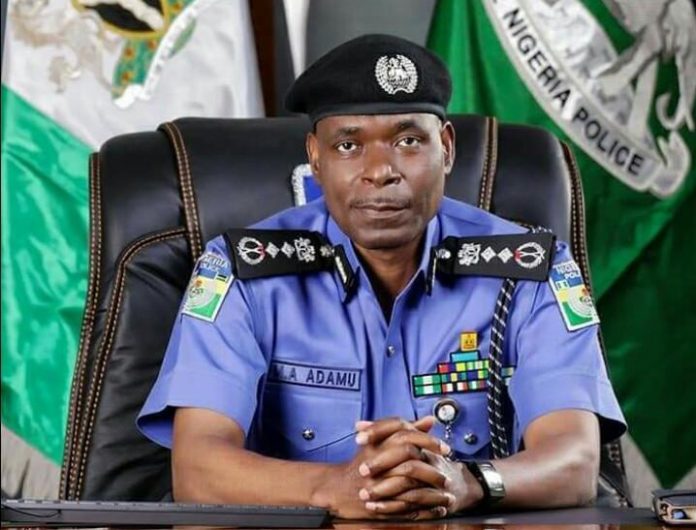FG Commences Recruitment Of 40,000 Constables For Community Policing


IG asks police commissioners, traditional rulers, others to form screening committees
South-West governors to meet again over law backing Amotekun
Our members can’t take up constable jobs –Akintoye
Attempt to stop regional security outfit’ll tear Nigeria apart -Ex-Gov EzeifeThe Federal Government has directed the police hierarchy to commence the recruitment of special constables nationwide preparatory to the implementation of its community policing policy.
The directive on community policing is coming as the Western Nigeria Security Network, codenamed Operation Amotekun, an initiative of the six South-West governors, is gaining momentum.
The governors had set up Amotekun to complement the efforts of the police in tackling insecurity in the region. The Attorney General and Minister of Justice, Abubakar Malami, who reportedly described it as “illegal” has since said he was misquoted.
The opposition to the takeoff of the security outfit appears to have been cleared after the South-West governors met with Vice-President Yemi Osinbajo, the Inspector-General of Police, Mohammed Adamu, and Malami in Abuja on Thursday.
To begin the recruitment of constables, Adamu has directed state police commands to set up screening committees.
In a wireless message obtained by Sunday PUNCH, the IG ordered all state Commissioners of Police, Assistant Commissioners of Police and Divisional Police Officers to liaise with traditional rulers and community leaders in their domains to screen volunteers who would be engaged after passing the screening tests.
One of our correspondents, in an exclusive report in May 2019, revealed the decision of the police to engage about 40,000 special constables to complement the conventional police.
At least, 50 volunteers will be recruited from each of the 774 local government areas in the country. The recruitment earlier scheduled for August last year failed to take place.
The police wireless message with reference DTO:231704/01/2020, announcing the commencement of the recruitment, was copied to Zonal Assistant Inspectors-General of Police, departments and formations.
It read, “INGENPOL (IG) directs that you be informed that (the) Federal Government has given approval for recruitment of special constables as a step forward to enhancing (the) community policing policy nationwide.
“INGENPOL further directs all commands’ CPs, ACPs and DPOs in your respective commands to liaise with traditional rulers and community leaders in your respective areas to form screening committees that will screen volunteers who must be of good character and who will eventually be recruited as special constables.”
The message added, “All those to be recommended must be resident in their respective communities and must also be between the ages of 21 and 50 with (the) willingness to serve the community.”
The IG told the CPs, ACPs and DPOs to study the Police Act 49 and 50 for proper guidance while urging them to provide updates on his directives.
One of our correspondents had reported that pastors, Imams, teachers, lawyers, journalists and youths would be considered for the volunteer job.
But the special constables, who would not be armed, are expected to handle charge room and administrative duties, crowd control, accident scene duties, alternative dispute resolution and other less sensitive and less risky functions.
They will dress in police uniform but with a different force numbers to distinguish them from the regular cops.
Force Public Relations Officer, DCP Frank Mba, said the candidates for the constabulary must be physically fit and gainfully employed.
Governor of Plateau State, Simon Lalong, on Friday said the Progressives Governors’ Forum had decided to back community policing.
Lalong, who is the co-chairman of the Progressives Governors Forum Governance Programme Steering Committee after their meeting in Abuja, said they also met to approve the proposed 2020 work plan, programme of activities and design policies for the implementation for good governance in states controlled by the All Progressives Congress.
He stated, “Here, we are not talking about Amotekun, we are talking about general insecurity. On the general term, what we did after a presentation from the security agencies is all of us appear to be talking about community policing.”
Middle Belt opposes govs on community policing
But the Middle Belt Forum opposed the plans by the governors to implement community policing, stating that a regional security outfit like Amotekun would be more effective in curbing insecurity in the Middle Belt.
The forum asked Governors Samuel Ortom (Benue), Darius Ishaku (Taraba), Lalong (Plateau), Ahmadu Fintiri (Adamawa) and Bala Mohammed (Bauchi) to evolve new measures to end the ongoing bloodshed in their states.
The MBF National President, Dr Bitrus Pogu, in a statement on Saturday, said he expected the state executives to invest more efforts in addressing the bloodshed and massive destruction by terrorists on the middle belt.
It said, “Considering the horrifying activities that have drawn global attention, the forum calls on the governors to work towards the creation of a security network similar to Operation Amotekun to obliterate all forms of insecurity in defenceless communities.
“We believe that a security outfit like Operation Amotekun will serve our communities better than the proposed community policing which is similar to the work currently being done by informants in providing intelligence to the police.”
Pogu called on the governors to be committed to the protection of lives and properties.
He advised the state governments to collaborate with the relevant agencies of the Federal Government to end the security challenges facing the Middle Belt.
Pogu also told the governors to let critical stakeholders to be part of their policy implementation in their states.
The MBF asked the states to embark on a massive infrastructure development to lay the foundation for industrialisation to make the economy of the region viable.
Meanwhile, Mba said the police were putting final touches to the implementation of the community policing policy, adding that they were in the process of setting up the screening committees.





Responses